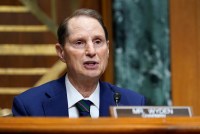Latest KFF Health News Stories
Diabetes Drug’s New Weight Loss Formula Fuels Cost-Benefit Debate
Health plans’ coverage of the medication, branded as Wegovy — which has a $1,300-a-month price tag — is not a sure thing.
Olympic Dream Dashed After Bike Crash and Nightmare Medical Bill Over $200K
A bicyclist from California competed in a Pennsylvania race that could have landed him in this month’s Tokyo Olympics. Instead, a crash on the velodrome track landed him in two hospitals where his out-of-state, out-of-network surgeries garnered huge bills.
Sign-Up Window for Free COBRA Coverage for Many Laid-Off Workers Closes This Week
The most recent covid relief law offered federal funding to pay insurance premiums for workers who lost their jobs and opted to keep their workplace insurance through COBRA. But the window to take advantage of the subsidized coverage is closing: Many workers would need to enroll in the program by July 31.
Bye-Bye to Health Insurance ‘Birthday Rule’? Kansas Lawmaker Floats Fix
U.S. Rep. Sharice Davids (D-Kansas) introduced a bill to do away with a health insurance rule that dictates which parent’s plan becomes a new baby’s primary insurer. This could save some parents from unexpected, sometimes massive medical bills. Davids took up the issue after a KHN/NPR Bill of the Month story on one family’s unexpected $207,455 NICU bill.
Contraception Is Free to Women, Except When It’s Not
The landmark federal health law required most commercial health plans to cover a comprehensive list of birth control methods approved by the Food and Drug Administration free of charge to female patients. But health plans don’t have to cover every option, and newer methods are not included in the federal list of covered services.
Readers and Tweeters Connect the Dots on Topics From Vaccine Development to Long Covid
Kaiser Health News gives readers a chance to comment on a recent batch of stories.
Sen. Wyden: $3.5T Budget May Have to Trim but It Can Set a Path to ‘Ambitious Goals’
Sen. Ron Wyden (D-Ore.), who is helping to negotiate the health care spending framework for the Democrats’ budget plan, said lawmakers may have to settle for very basic versions of programs deployed in the package. But the key, he added, is to get the “architecture of these changes, bold changes,” started and show people what is possible.
KHN’s ‘What the Health?’: Here Comes Reconciliation
Democrats in Congress reached a tentative agreement to press ahead on a partisan bill that would dramatically expand health benefits for people on Medicare, those who buy their own insurance and individuals who have been shut out of coverage in states that didn’t expand Medicaid. Meanwhile, controversy continues to rage over whether vaccinated Americans will need a booster to protect against covid-19 variants, and who will pay for a new drug to treat Alzheimer’s disease. Rachel Cohrs of Stat and Sarah Karlin-Smith of the Pink Sheet join KHN’s Julie Rovner to discuss these issues and more. Also, Rovner interviews KHN’s Rae Ellen Bichell, who reported and wrote the latest KHN-NPR “Bill of the Month” episode about a mother and daughter who fought an enormous emergency room bill.
Hospital Prices Must Now Be Transparent. For Many Consumers, They’re Still Anyone’s Guess.
A Trump administration rule mandating that hospitals disclose true prices on their websites took effect this year. But compliance is spotty and even when the data is public, it’s hard to find and understand.
KHN’s ‘What the Health?’: Un-Trumping the ACA
The Biden administration is moving to undo many of the changes the Trump administration made to the enrollment process for the Affordable Care Act to encourage more people to sign up for health insurance. Meanwhile, Congress is opening investigations into the controversial approval by the Food and Drug Administration of an expensive drug that might (or might not) slow the progression of Alzheimer’s disease. Joanne Kenen of Politico, Kimberly Leonard of Insider and Sarah Karlin-Smith of the Pink Sheet join KHN’s Julie Rovner to discuss these issues and more. Also, Rovner interviews Marshall Allen of ProPublica about his new book, “Never Pay the First Bill: And Other Ways to Fight the Health Care System and Win.”
States Step Up Push to Regulate Pharmacy Drug Brokers
In an ongoing effort to control prescription drug costs, states are targeting the companies that mediate deals among drug manufacturers, health insurers and pharmacies. The pharmacy benefit managers say they negotiate lower prices for patients, yet the nitty-gritty occurs largely behind a curtain that lawmakers are trying to pull back.
Children and Covid: Journalists Explore Grief and Vaccine Side Effects
KHN and California Healthline staff made the rounds on national and local media this week to discuss their stories. Here’s a collection of their appearances.
KHN’s ‘What the Health?’: How to Expand Health Coverage
Democrats in Congress and the states are devising strategies to expand health coverage — through the Affordable Care Act, Medicare, Medicaid and a “public option.” But progress remains halting, at best. Meanwhile, lawmakers in Washington may have to agree on how to control prescription drug prices if they wish to finance their coverage initiatives. Alice Miranda Ollstein of Politico, Tami Luhby of CNN and Shefali Luthra of The 19th join KHN’s Julie Rovner to discuss these issues and more. Also, Rovner interviews Michelle Andrews, who reported and wrote last month’s KHN-NPR “Bill of the Month” episode about a very expensive sleep study.
Miles de niños perdieron a sus padres por covid. ¿Adónde está la ayuda?
Más de 46,000 niños han perdido a uno o ambos padres a causa de covid desde febrero de 2020. Los sobrevivientes luchan por conseguir ayuda médica y financiera para superar el duelo.
At Texas Border, Pandemic’s High Toll Lays Bare Gaps in Health and Insurance
In Texas’ border communities, which are overwhelmingly Hispanic, covid-19 death rates for people under age 65 were double those in the rest of the state and three times the national average. They were also significantly higher than rates in New Mexico border areas.
Thousands of Young Children Lost Parents to Covid. Where’s Help for Them?
More than 46,000 children in the U.S. have lost a parent to covid-19. Families say finding even basic grief counseling has been difficult and there’s been no coordinated effort to help these children access services or benefits.
KHN’s ‘What the Health?’: The ACA Lives
In a surprisingly strong 7-2 decision, the Supreme Court turned back the latest constitutional challenge to the Affordable Care Act, likely heralding the end of GOP efforts to strike the law in its entirety through court action. Meanwhile, Democratic lawmakers are looking for ways to expand health benefits. Joanne Kenen of Politico, Mary Ellen McIntire of CQ Roll Call and Rachel Cohrs of Stat join KHN’s Julie Rovner to discuss these issues and more. Also, Rovner interviews Andy Slavitt, who recently stepped down from the Biden administration’s covid response team, about his new book on the pandemic.
Pandemia eleva el número de beneficiarios de Medicaid a más de 80 millones
Las últimas cifras de inscripción al Medicaid muestran que creció de 71,3 millones de miembros en febrero de 2020, cuando la pandemia comenzaba en los Estados Unidos, a 80,5 millones en enero, según un análisis de KFF de datos federales.
Pandemic Swells Medicaid Enrollment to 80 Million People, a ‘High-Water Mark’
More than 80 million Americans with low incomes were receiving health coverage through the federal-state program in January. The program now covers nearly 1 in 4 people nationwide.
‘An Arm and a Leg’: When Your Insurance Company Says No, How to Ask for a Yes
Health care insiders get surprise medical bills, too. One of them shares tips for writing an insurance appeal.





















